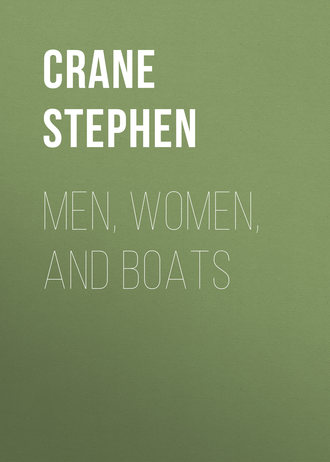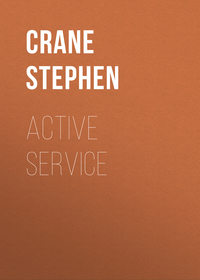 полная версия
полная версияMen, Women, and Boats
Two men huddled in the stern, and distances were so magnificent in the dingey that the rower was enabled to keep his feet partly warmed by thrusting them under his companions. Their legs indeed extended far under the rowing-seat until they touched the feet of the captain forward. Sometimes, despite the efforts of the tired oarsman, a wave came piling into the boat, an icy wave of the night, and the chilling water soaked them anew. They would twist their bodies for a moment and groan, and sleep the dead sleep once more, while the water in the boat gurgled about them as the craft rocked.
The plan of the oiler and the correspondent was for one to row until he lost the ability, and then arouse the other from his sea-water couch in the bottom of the boat.
The oiler plied the oars until his head drooped forward, and the overpowering sleep blinded him. And he rowed yet afterward. Then he touched a man in the bottom of the boat, and called his name. "Will you spell me for a little while?" he said, meekly.
"Sure, Billie," said the correspondent, awakening and dragging himself to a sitting position. They exchanged places carefully, and the oiler, cuddling down in the sea-water at the cook's side, seemed to go to sleep instantly.
The particular violence of the sea had ceased. The waves came without snarling. The obligation of the man at the oars was to keep the boat headed so that the tilt of the rollers would not capsize her, and to preserve her from filling when the crests rushed past. The black waves were silent and hard to be seen in the darkness. Often one was almost upon the boat before the oarsman was aware.
In a low voice the correspondent addressed the captain. He was not sure that the captain was awake, although this iron man seemed to be always awake. "Captain, shall I keep her making for that light north, sir?"
The same steady voice answered him. "Yes. Keep it about two points off the port bow."
The cook had tied a life-belt around himself in order to get even the warmth which this clumsy cork contrivance could donate, and he seemed almost stove-like when a rower, whose teeth invariably chattered wildly as soon as he ceased his labor, dropped down to sleep.
The correspondent, as he rowed, looked down at the two men sleeping under-foot. The cook's arm was around the oiler's shoulders, and, with their fragmentary clothing and haggard faces, they were the babes of the sea, a grotesque rendering of the old babes in the wood.
Later he must have grown stupid at his work, for suddenly there was a growling of water, and a crest came with a roar and a swash into the boat, and it was a wonder that it did not set the cook afloat in his life-belt. The cook continued to sleep, but the oiler sat up, blinking his eyes and shaking with the new cold.
"Oh, I'm awful sorry, Billie," said the correspondent contritely.
"That's all right, old boy," said the oiler, and lay down again and was asleep.
Presently it seemed that even the captain dozed, and the correspondent thought that he was the one man afloat on all the oceans. The wind had a voice as it came over the waves, and it was sadder than the end.
There was a long, loud swishing astern of the boat, and a gleaming trail of phosphorescence, like blue flame, was furrowed on the black waters. It might have been made by a monstrous knife.
Then there came a stillness, while the correspondent breathed with the open mouth and looked at the sea.
Suddenly there was another swish and another long flash of bluish light, and this time it was alongside the boat, and might almost have been reached with an oar. The correspondent saw an enormous fin speed like a shadow through the water, hurling the crystalline spray and leaving the long glowing trail.
The correspondent looked over his shoulder at the captain. His face was hidden, and he seemed to be asleep. He looked at the babes of the sea. They certainly were asleep. So, being bereft of sympathy, he leaned a little way to one side and swore softly into the sea.
But the thing did not then leave the vicinity of the boat. Ahead or astern, on one side or the other, at intervals long or short, fled the long sparkling streak, and there was to be heard the whirroo of the dark fin. The speed and power of the thing was greatly to be admired. It cut the water like a gigantic and keen projectile.
The presence of this biding thing did not affect the man with the same horror that it would if he had been a picnicker. He simply looked at the sea dully and swore in an undertone.
Nevertheless, it is true that he did not wish to be alone. He wished one of his companions to awaken by chance and keep him company with it. But the captain hung motionless over the water-jar, and the oiler and the cook in the bottom of the boat were plunged in slumber.
VI
"If I am going to be drowned—if I am going to be drowned—if I am going to be drowned, why, in the name of the seven mad gods who rule the sea, was I allowed to come thus far and contemplate sand and trees?"
During this dismal night, it may be remarked that a man would conclude that it was really the intention of the seven mad gods to drown him, despite the abominable injustice of it. For it was certainly an abominable injustice to drown a man who had worked so hard, so hard. The man felt it would be a crime most unnatural. Other people had drowned at sea since galleys swarmed with painted sails, but still—
When it occurs to a man that nature does not regard him as important, and that she feels she would not maim the universe by disposing of him, he at first wishes to throw bricks at the temple, and he hates deeply the fact that there are no brick and no temples. Any visible expression of nature would surely be pelleted with his jeers.
Then, if there be no tangible thing to hoot he feels, perhaps, the desire to confront a personification and indulge in pleas, bowed to one knee, and with hands supplicant, saying: "Yes, but I love myself."
A high cold star on a winter's night is the word he feels that she says to him. Thereafter he knows the pathos of his situation.
The men in the dingey had not discussed these matters, but each had, no doubt, reflected upon them in silence and according to his mind. There was seldom any expression upon their faces save the general one of complete weariness. Speech was devoted to the business of the boat.
To chime the notes of his emotion, a verse mysteriously entered the correspondent's head. He had even forgotten that he had forgotten this verse, but it suddenly was in his mind.
"A soldier of the Legion lay dying in Algiers, There was a lack of woman's nursing, there was dearth of woman's tears;
But a comrade stood beside him, and he took that comrade's hand, And he said: 'I shall never see my own, my native land.'"
In his childhood, the correspondent had been made acquainted with the fact that a soldier of the Legion lay dying in Algiers, but he had never regarded the fact as important. Myriads of his school-fellows had informed him of the soldier's plight, but the dinning had naturally ended by making him perfectly indifferent. He had never considered it his affair that a soldier of the Legion lay dying in Algiers, nor had it appeared to him as a matter for sorrow. It was less to him than the breaking of a pencil's point.
Now, however, it quaintly came to him as a human, living thing. It was no longer merely a picture of a few throes in the breast of a poet, meanwhile drinking tea and warming his feet at the grate; it was an actuality—stern, mournful, and fine.
The correspondent plainly saw the soldier. He lay on the sand with his feet out straight and still. While his pale left hand was upon his chest in an attempt to thwart the going of his life, the blood came between his fingers. In the far Algerian distance, a city of low square forms was set against a sky that was faint with the last sunset hues. The correspondent, plying the oars and dreaming of the slow and slower movements of the lips of the soldier, was moved by a profound and perfectly impersonal comprehension. He was sorry for the soldier of the Legion who lay dying in Algiers.
The thing which had followed the boat and waited, had evidently grown bored at the delay. There was no longer to be heard the slash of the cut-water, and there was no longer the flame of the long trail. The light in the north still glimmered, but it was apparently no nearer to the boat. Sometimes the boom of the surf rang in the correspondent's ears, and he turned the craft seaward then and rowed harder. Southward, some one had evidently built a watch-fire on the beach. It was too low and too far to be seen, but it made a shimmering, roseate reflection upon the bluff back of it, and this could be discerned from the boat. The wind came stronger, and sometimes a wave suddenly raged out like a mountain-cat, and there was to be seen the sheen and sparkle of a broken crest.
The captain, in the bow, moved on his water-jar and sat erect. "Pretty long night," he observed to the correspondent. He looked at the shore. "Those life-saving people take their time."
"Did you see that shark playing around?"
"Yes, I saw him. He was a big fellow, all right."
"Wish I had known you were awake."
Later the correspondent spoke into the bottom of the boat.
"Billie!" There was a slow and gradual disentanglement. "Billie, will you spell me?"
"Sure," said the oiler.
As soon as the correspondent touched the cold comfortable sea-water in the bottom of the boat, and had huddled close to the cook's life-belt he was deep in sleep, despite the fact that his teeth played all the popular airs. This sleep was so good to him that it was but a moment before he heard a voice call his name in a tone that demonstrated the last stages of exhaustion. "Will you spell me?"
"Sure, Billie."
The light in the north had mysteriously vanished, but the correspondent took his course from the wide-awake captain.
Later in the night they took the boat farther out to sea, and the captain directed the cook to take one oar at the stern and keep the boat facing the seas. He was to call out if he should hear the thunder of the surf. This plan enabled the oiler and the correspondent to get respite together. "We'll give those boys a chance to get into shape again," said the captain. They curled down and, after a few preliminary chatterings and trembles, slept once more the dead sleep. Neither knew they had bequeathed to the cook the company of another shark, or perhaps the same shark.
As the boat caroused on the waves, spray occasionally bumped over the side and gave them a fresh soaking, but this had no power to break their repose. The ominous slash of the wind and the water affected them as it would have affected mummies.
"Boys," said the cook, with the notes of every reluctance in his voice, "she's drifted in pretty close. I guess one of you had better take her to sea again." The correspondent, aroused, heard the crash of the toppled crests.
As he was rowing, the captain gave him some whisky-and-water, and this steadied the chills out of him. "If I ever get ashore and anybody shows me even a photograph of an oar—"
At last there was a short conversation.
"Billie…. Billie, will you spell me?"
"Sure," said the oiler.
VII
When the correspondent again opened his eyes, the sea and the sky were each of the grey hue of the dawning. Later, carmine and gold was painted upon the waters. The morning appeared finally, in its splendor, with a sky of pure blue, and the sunlight flamed on the tips of the waves.
On the distant dunes were set many little black cottages, and a tall white windmill reared above them. No man, nor dog, nor bicycle appeared on the beach. The cottages might have formed a deserted village.
The voyagers scanned the shore. A conference was held in the boat. "Well," said the captain, "if no help is coming we might better try a run through the surf right away. If we stay out here much longer we will be too weak to do anything for ourselves at all." The others silently acquiesced in this reasoning. The boat was headed for the beach. The correspondent wondered if none ever ascended the tall wind-tower, and if then they never looked seaward. This tower was a giant, standing with its back to the plight of the ants. It represented in a degree, to the correspondent, the serenity of nature amid the struggles of the individual—nature in the wind, and nature in the vision of men. She did not seem cruel to him then, nor beneficent, nor treacherous, nor wise. But she was indifferent, flatly indifferent. It is, perhaps, plausible that a man in this situation, impressed with the unconcern of the universe, should see the innumerable flaws of his life, and have them taste wickedly in his mind and wish for another chance. A distinction between right and wrong seems absurdly clear to him, then, in this new ignorance of the grave-edge, and he understands that if he were given another opportunity he would mend his conduct and his words, and be better and brighter during an introduction or at a tea.
"Now, boys," said the captain, "she is going to swamp, sure. All we can do is to work her in as far as possible, and then when she swamps, pile out and scramble for the beach. Keep cool now, and don't jump until she swamps sure."
The oiler took the oars. Over his shoulders he scanned the surf. "Captain," he said, "I think I'd better bring her about, and keep her head-on to the seas and back her in."
"All right, Billie," said the captain. "Back her in." The oiler swung the boat then and, seated in the stern, the cook and the correspondent were obliged to look over their shoulders to contemplate the lonely and indifferent shore.
The monstrous in-shore rollers heaved the boat high until the men were again enabled to see the white sheets of water scudding up the slanted beach. "We won't get in very close," said the captain. Each time a man could wrest his attention from the rollers, he turned his glance toward the shore, and in the expression of the eyes during this contemplation there was a singular quality. The correspondent, observing the others, knew that they were not afraid, but the full meaning of their glances was shrouded.
As for himself, he was too tired to grapple fundamentally with the fact. He tried to coerce his mind into thinking of it, but the mind was dominated at this time by the muscles, and the muscles said they did not care. It merely occurred to him that if he should drown it would be a shame.
There were no hurried words, no pallor, no plain agitation. The men simply looked at the shore. "Now, remember to get well clear of the boat when you jump," said the captain.
Seaward the crest of a roller suddenly fell with a thunderous crash, and the long white comber came roaring down upon the boat.
"Steady now," said the captain. The men were silent. They turned their eyes from the shore to the comber and waited. The boat slid up the incline, leaped at the furious top, bounced over it, and swung down the long back of the wave. Some water had been shipped and the cook bailed it out.
But the next crest crashed also. The tumbling, boiling flood of white water caught the boat and whirled it almost perpendicular. Water swarmed in from all sides. The correspondent had his hands on the gunwale at this time, and when the water entered at that place he swiftly withdrew his fingers, as if he objected to wetting them.
The little boat, drunken with this weight of water, reeled and snuggled deeper into the sea.
"Bail her out, cook! Bail her out," said the captain.
"All right, captain," said the cook.
"Now, boys, the next one will do for us, sure," said the oiler. "Mind to jump clear of the boat."
The third wave moved forward, huge, furious, implacable. It fairly swallowed the dingey, and almost simultaneously the men tumbled into the sea. A piece of lifebelt had lain in the bottom of the boat, and as the correspondent went overboard he held this to his chest with his left hand.
The January water was icy, and he reflected immediately that it was colder than he had expected to find it on the coast of Florida. This appeared to his dazed mind as a fact important enough to be noted at the time. The coldness of the water was sad; it was tragic. This fact was somehow so mixed and confused with his opinion of his own situation that it seemed almost a proper reason for tears. The water was cold.
When he came to the surface he was conscious of little but the noisy water. Afterward he saw his companions in the sea. The oiler was ahead in the race. He was swimming strongly and rapidly. Off to the correspondent's left, the cook's great white and corked back bulged out of the water, and in the rear the captain was hanging with his one good hand to the keel of the overturned dingey.
There is a certain immovable quality to a shore, and the correspondent wondered at it amid the confusion of the sea.
It seemed also very attractive, but the correspondent knew that it was a long journey, and he paddled leisurely. The piece of life-preserver lay under him, and sometimes he whirled down the incline of a wave as if he were on a handsled.
But finally he arrived at a place in the sea where travel was beset with difficulty. He did not pause swimming to inquire what manner of current had caught him, but there his progress ceased. The shore was set before him like a bit of scenery on a stage, and he looked at it and understood with his eyes each detail of it.
As the cook passed, much farther to the left, the captain was calling to him, "Turn over on your back, cook! Turn over on your back and use the oar."
"All right, sir." The cook turned on his back, and, paddling with an oar, went ahead as if he were a canoe.
Presently the boat also passed to the left of the correspondent with the captain clinging with one hand to the keel. He would have appeared like a man raising himself to look over a board fence, if it were not for the extraordinary gymnastics of the boat. The correspondent marvelled that the captain could still hold to it.
They passed on, nearer to shore—the oiler, the cook, the captain—and following them went the water-jar, bouncing gaily over the seas.
The correspondent remained in the grip of this strange new enemy—a current. The shore, with its white slope of sand and its green bluff, topped with little silent cottages, was spread like a picture before him. It was very near to him then, but he was impressed as one who in a gallery looks at a scene from Brittany or Holland.
He thought: "I am going to drown? Can it be possible Can it be possible? Can it be possible?" Perhaps an individual must consider his own death to be the final phenomenon of nature.
But later a wave perhaps whirled him out of this small, deadly current, for he found suddenly that he could again make progress toward the shore. Later still, he was aware that the captain, clinging with one hand to the keel of the dingey, had his face turned away from the shore and toward him, and was calling his name. "Come to the boat! Come to the boat!"
In his struggle to reach the captain and the boat, he reflected that when one gets properly wearied, drowning must really be a comfortable arrangement, a cessation of hostilities accompanied by a large degree of relief, and he was glad of it, for the main thing in his mind for some months had been horror of the temporary agony. He did not wish to be hurt.
Presently he saw a man running along the shore. He was undressing with most remarkable speed. Coat, trousers, shirt, everything flew magically off him.
"Come to the boat," called the captain.
"All right, captain." As the correspondent paddled, he saw the captain let himself down to bottom and leave the boat. Then the correspondent performed his one little marvel of the voyage. A large wave caught him and flung him with ease and supreme speed completely over the boat and far beyond it. It struck him even then as an event in gymnastics, and a true miracle of the sea. An over-turned boat in the surf is not a plaything to a swimming man.
The correspondent arrived in water that reached only to his waist, but his condition did not enable him to stand for more than a moment. Each wave knocked him into a heap, and the under-tow pulled at him.
Then he saw the man who had been running and undressing, and undressing and running, come bounding into the water. He dragged ashore the cook, and then waded towards the captain, but the captain waved him away, and sent him to the correspondent. He was naked, naked as a tree in winter, but a halo was about his head, and he shone like a saint. He gave a strong pull, and a long drag, and a bully heave at the correspondent's hand. The correspondent, schooled in the minor formulae, said: "Thanks, old man." But suddenly the man cried: "What's that?" He pointed a swift finger. The correspondent said: "Go."
In the shallows, face downward, lay the oiler. His forehead touched sand that was periodically, between each wave, clear of the sea.
The correspondent did not know all that transpired afterward. When he achieved safe ground he fell, striking the sand with each particular part of his body. It was as if he had dropped from a roof, but the thud was grateful to him.
It seems that instantly the beach was populated with men with blankets, clothes, and flasks, and women with coffeepots and all the remedies sacred to their minds. The welcome of the land to the men from the sea was warm and generous, but a still and dripping shape was carried slowly up the beach, and the land's welcome for it could only be the different and sinister hospitality of the grave.
When it came night, the white waves paced to and fro in the moonlight, and the wind brought the sound of the great sea's voice to the men on shore, and they felt that they could then be interpreters.
THE RELUCTANT VOYAGERS
CHAPTER I
Two men sat by the sea waves.
"Well, I know I'm not handsome," said one gloomily. He was poking holes in the sand with a discontented cane.
The companion was watching the waves play. He seemed overcome with perspiring discomfort as a man who is resolved to set another man right.
Suddenly his mouth turned into a straight line.
"To be sure you are not," he cried vehemently.
"You look like thunder. I do not desire to be unpleasant, but I must assure you that your freckled skin continually reminds spectators of white wall paper with gilt roses on it. The top of your head looks like a little wooden plate. And your figure—heavens!"
For a time they were silent. They stared at the waves that purred near their feet like sleepy sea-kittens.
Finally the first man spoke.
"Well," said he, defiantly, "what of it?"
"What of it?" exploded the other. "Why, it means that you'd look like blazes in a bathing-suit."
They were again silent. The freckled man seemed ashamed. His tall companion glowered at the scenery.
"I am decided," said the freckled man suddenly. He got boldly up from the sand and strode away. The tall man followed, walking sarcastically and glaring down at the round, resolute figure before him.
A bath-clerk was looking at the world with superior eyes through a hole in a board. To him the freckled man made application, waving his hands over his person in illustration of a snug fit. The bath-clerk thought profoundly. Eventually, he handed out a blue bundle with an air of having phenomenally solved the freckled man's dimensions.
The latter resumed his resolute stride.
"See here," said the tall man, following him, "I bet you've got a regular toga, you know. That fellow couldn't tell—"
"Yes, he could," interrupted the freckled man, "I saw correct mathematics in his eyes."
"Well, supposin' he has missed your size. Supposin'—"
"Tom," again interrupted the other, "produce your proud clothes and we'll go in."
The tall man swore bitterly. He went to one of a row of little wooden boxes and shut himself in it. His companion repaired to a similar box.
At first he felt like an opulent monk in a too-small cell, and he turned round two or three times to see if he could. He arrived finally into his bathing-dress. Immediately he dropped gasping upon a three-cornered bench. The suit fell in folds about his reclining form. There was silence, save for the caressing calls of the waves without.








